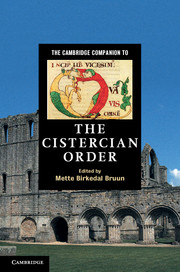Book contents
- Frontmatter
- Contents
- Figures
- Contributors
- Preface
- Abbreviations
- Introduction
- Part I History
- Part II Structure and materiality
- 4 Centres and peripheries
- 5 The Cistercian community
- 6 Constitutions and the General Chapter
- 7 Nuns
- 8 Agriculture and economies
- 9 Art
- 10 Libraries and scriptoria
- 11 Cistercian architecture or architecture of the Cistercians?
- Part III Religious mentality
- Map of Cistercian monasteries
- Primary sources
- Further reading
- Index
- References
10 - Libraries and scriptoria
from Part II - Structure and materiality
Published online by Cambridge University Press: 05 December 2012
- Frontmatter
- Contents
- Figures
- Contributors
- Preface
- Abbreviations
- Introduction
- Part I History
- Part II Structure and materiality
- 4 Centres and peripheries
- 5 The Cistercian community
- 6 Constitutions and the General Chapter
- 7 Nuns
- 8 Agriculture and economies
- 9 Art
- 10 Libraries and scriptoria
- 11 Cistercian architecture or architecture of the Cistercians?
- Part III Religious mentality
- Map of Cistercian monasteries
- Primary sources
- Further reading
- Index
- References
Summary
Some fifty years after Robert of Molesme and his twenty-one companions had founded the New Monastery in 1098 – the Novum Monasterium which would become the abbey of Cîteaux – the Order enacted legislation which specified the minimum number and nature of the books which each abbey was required to possess. The list appears in the Institutes of the General Chapter (Instituta Generalis Capituli), dating from about 1147, and the list is brief: apart from the Rule of St Benedict (the fundamental guide to Cistercian life), it includes only liturgical volumes necessary for the daily worship of God, the opus Dei: Missal, Epistolary (Epistle Book), Evangeliary (Gospel Book), Collectary (which contained the collects and other formulae for the celebration of the Divine Office), Gradual (containing the mass chants), Antiphonary (containing the Office chants), Hymnal, Psalter, Night-Office Lectionary and Martyrology. A little later, as part of the process of updating, the Book of Usages (Liber usuum) was added to the list.
This is not to say, however, that these were the only books required in any Cistercian monastery. Chapter 48 of the Rule of St Benedict stipulates that every religious – monk or nun – should be given a book from the common collection at the start of Lent and read it through from beginning to end, and it follows from this that any monastery must have had in its collection at least as many books as there were religious. From the foundation of the Order until about the end of the twelfth century, a library of sixty to eighty books would not have been uncommon.
- Type
- Chapter
- Information
- The Cambridge Companion to the Cistercian Order , pp. 140 - 150Publisher: Cambridge University PressPrint publication year: 2012

